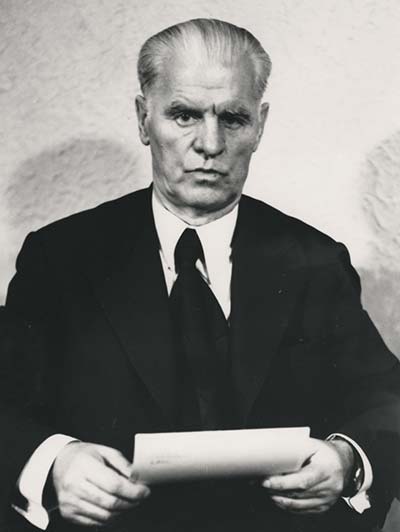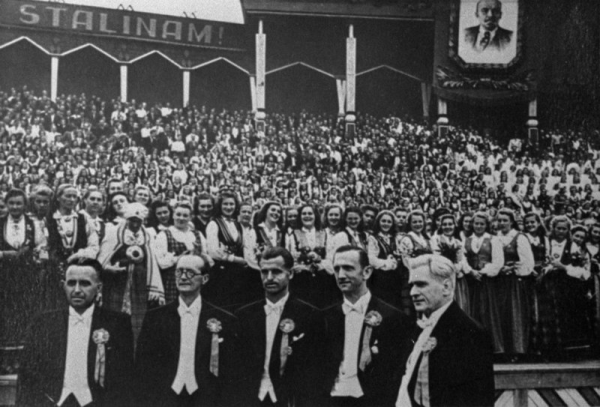Jānis Ozoliņš
1908–1981
Conductor, educator, composer
Born on 30 May 1908 in Jelgava. Studied at the Škibe, then the Dobele elementary school and secondary school (1923-1926), actively participating in the school orchestra and choir.
Continued his education at the Jelgava Teachers’ Institute (1926-1939) and the Jelgava People’s Conservatory, studying music theory, the fundamentals of composition and a number of instruments. Graduated from the Rīga People’s Conservatory’s Brass-band conducting class (1931) and enrolled in Singing- and Music-teaching courses organised by the Conservatory of Latvia (1932-1935).
At the same time, worked at various general-education schools in Rīga (1930-1941) and at the Jelgava Teachers’ Institute (1940-1941), also conducting choirs and brass bands – he led the Jelgava People’s Centre choir and brass band (1926-1934), the Jelgava Teachers’ Institute choir and school ensembles.
During the Second World War, he founded and directed the State Art Ensemble of the Latvian SSR (1942-1944) in Ivanov, Russia, which continues to perform in Rīga as the Latvian State Philharmonic Choir (now the Latvija State Academic Choir). He was the artistic director and principal conductor of this choir until 1953. Worked as the artistic director of the State Philharmonic Society of the Latvian SSR (1946-1948), Executive Secretary of the Board of the Latvian SSR Composers’ Union (1948-1950) and was a long-time lecturer in the Latvian State Conservatory’s choir-conducting department (1951-1981), and also the rector of the conservatory from 1951 to 1977.
Acted as a chief conductor for 40 years, being a chief conductor at the Xth-XVIth All-Latvian Song Festivals and Honorary chief conductor at the XVII and XVIIIth All-Latvian Song Festivals. Was also a chief conductor at many county and district song festivals, choir and orchestra gatherings, as well as at Latvian School Song and Dance Festivals.
As a composer, he was one of the most egalitarian of the 1950s and 60s. The songs he composed (about 300 choral and 40 solo songs) were intended for mass audiences – easily comprehended, emotionally stirring, eminently melodic. And the people loved these tunes – from the songs Trīs draugi (Three Friends) and Latviešu strēlnieku dziesma (Reiz cēlās strēlnieks sarkanais) (Latvian Riflemens’ Song (Once a Red Rifleman Rose up)) written during the war, to Skolas gadi (School Years), much loved at school song festivals.
He was always an enthusiast for amateur artistic activities – he actively conducted and directed choirs throughout Latvia. His special love was schoolchildren’s choirs, working with school groups and participating in the preparation of programmes for countless school and youth song festivals. Arturs Verners writes about the conductor’s enthusiasm when performing: “Taking rapid, definite steps, he arrives on stage, there is nothing superfluous in his conductor’s stance. Every hand movement and glance is clear, unambiguous, and invigorating. With relatively miserly, restrained means, he stimulates the performers into a genuinely emotional artistic experience, in some moments making their voices unfold as a blustering force, in others become soft as the wafts of an owl’s wing.” (Grauzdiņa, Ilma, Izredzētie (The Chosen Few), 2008, p 104)
Latvian SSR Order of Honour for artistic endeavours (1947), received Honorary title of Latvian SSR People’s Artist (1965), was awarded the USSR Order of the Red Banner of Labour three times, Order of the Red Star and its Mark of Honour.















![Dziesmas ceļš :Jāņa Ozoliņa dzīve un daiļrade /A. Verners ; [mākslinieks K. Goldmanis]](https://dziesmusvetki.lndb.lv/wp-content/uploads/objects/488632/resized/2resized_thumbnail.png)

















